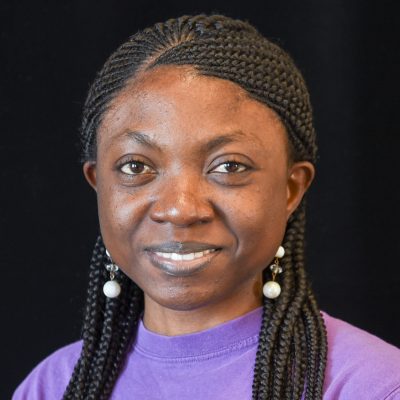Student Spotlight: Deborah Oluwasanya

May 26, 2020
Deborah Oluwasanya is a doctoral candidate in soil and crop sciences from Benue State, Nigeria. After earning a bachelor’s degree from Covenant University in Ota, Nigeria, she chose to pursue further study at Cornell due to the reputation of the field of plant sciences and network of scientists passionate about cassava.
What is your area of research and why is it important?
I study the reproductive development of tropical root crop, cassava (Manihot esculenta). There are multiple failure points in cassava’s reproductive development such as late flower development and in some cases complete failure to flower. When flowering is successful there are usually very few females – about 10% of total flowers on a plant will be females (cassava bears male and female flowers separately on the same flower head). Finally, successful flowering does not guarantee fruit and seed development as these can abort prematurely. My research seeks first to understand the regulation of cassava’s flowering time and then develop recipes to increase the number of female flowers and the likelihood of fruit set. These solutions are adapted to field conditions where they will be utilized.
My research supports cassava breeding as flowers are the tools breeders require to do their work. Female flowers in particular are important because they become fruits that become seeds which carry improved traits from breeding.
What are the larger implications of this research?
Cassava is a major food security crop, feeding over 800 million people in mostly in developing countries and sub-Saharan Africa in particular. Providing viable flowers to allow for breeding will enhance improvement of crop to withstand the challenges imposed by a changing world – from changing climates to new plant diseases.
What inspired you to choose this field of study?
Two things inspired my choice. First, while studying biochemistry for my bachelor’s I became fascinated with the regulation of processes in living things, especially plants that are not mobile but have to make the most of what their environment presents them to survive. Secondly, about the time I was ready for grad school, I found a unique opportunity to work on a plant that directly impacts food security in my home country, a topic that allows me to study how reproduction is regulated.
What have you gained by participating in the NextGen Professors Program?
One of the biggest takeaways from the NextGen Professors Program has been our Power Mentoring Sessions. These have granted me access to “inside information” from real faculty at different stages of their careers, and learning from their journeys that a faculty position is not “out of reach” for a person like me has been huge. I certainly feel very confident of the contributions I have to make to academia and the unique perspectives I can offer to students. The freedom to ask questions I otherwise don’t know where to ask and the support to navigate complicated matters have been unbelievable.
How has this program been helpful in working toward your professional goals?
NextGen Professors has equipped me with resources to develop a career strategy and provided me a network of excellent researchers I plan to do some excellent work with in the near future. In my mind it is like the bridge I needed to connect some of my thoughts with reality.
What are your hobbies or interests outside of your research or scholarship?
Besides my research I write poems and published my first collection in 2015 –“The Mystery of Surrender – life found through death”. I am also a mezzo-soprano/alto singer.
Why did you choose Cornell to pursue your degree?
I chose Cornell because of its reputation in the plant sciences and also because I found a network of scientists passionate about cassava.
